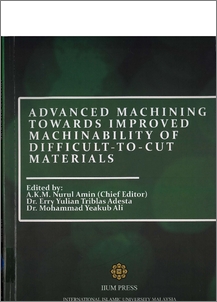Amin, A. K. M. Nurul and Kamaruddin, K. and Abdelgadir, M.
(2011)
Influence of workpiece preheating on chatter and machinability of Titanium alloy - Ti6Al4V.
In:
Advanced Machining Towards Improved Machinability of Difficult-to-Cut Materials.
IIUM Press, Kuala Lumpur, pp. 1-8.
ISBN 978-967-418-175-8
![[img]](http://irep.iium.edu.my/style/images/fileicons/application_pdf.png)  Preview |
|
PDF ( Influence of workpiece preheating on chatter and machinability of Titanium alloy - Ti6Al4V)
- Published Version
Download (475kB)
| Preview
|
Abstract
Though classified as a group of “difficult-to-cut” material, titanium and its alloys are have wide
applications in the aerospace industry owing to their unique high strength-weight ratio which is
maintained at elevated temperatures and their exceptional corrosion resistance. In this work,
experimental investigations of the influence of preheating using induction heating on
machinability of titanium alloy Ti-6Al-4V ASTM B348 were conducted. Uncoated straight grade
of cemented carbide inserts were used. The cutting speed was varied in the range from 40 to 160
m/min; with varying depths of cut and feed rates. The experiments of end milling operation
conducted on Vertical Machining Centre (VMC) were design to look into vibration and chatter,
chip formation, tool wear and surface finish. It has been established that the machinability of the
investigated titanium alloy can be enhanced in terms of lower tool wear, better surface finish,
lowering of instability of chip formation and chatter, increase in chip-tool contact length, shifting
of the hot spot away from the tool edge and finally lowering of the dynamic stresses acting on
the tool.
Unique combinations of properties such as, high specific strength, which is maintained at
elevated temperature, high fracture and corrosion resistance, have made titanium and its alloys
very useful materials for aerospace and petrochemical applications. However their high cost and
poor machinability are major constraints towards their wide spread applications. Ezugwu et al.
[1] observed that success machining of titanium and its alloys depends largely on overcoming the
problems associated with high cutting temperature and cutting pressures, small chip-tool contact
length (which is about 1/3 that in the case of steel), serrated chip formation and chatter. Chatter
is also undesirable because of its adverse effects on surface finish, machining accuracy and tool life [2]. Talantov and Amin [3] and Amin [4] established that chatter arises during machining
when the frequency of the chip tooth serration coincides with any one of the natural frequencies
of the system, such as the spindle, work, tool, fixtures, etc. According to Nakayama [5] and
Konig et al [6] the chip formation mechanism is based on exceeding the critical shear stress
under compressive and shear stresses.
In order to get better machining, many methods of chatter control have so far been tried [7, 8].
The present work aims at investigating the influence of induction heating of the workpiece on
improved machinability of the titanium alloy.
Actions (login required)
 |
View Item |


 Download Statistics
Download Statistics Download Statistics
Download Statistics